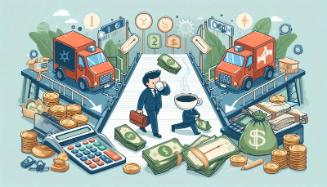Global Economic Outlook for 2025 – Key Trends & Predictions
The global economy faces uncertainties in 2025 due to inflation, interest rate shifts, and geopolitical tensions. This article analyzes major economic trends and how they impact businesses, investors, and everyday consumers.
What’s next for the global economy in 2025? Explore key trends, economic forecasts, and investment strategies to navigate market fluctuations and inflation.
Introduction – What to Expect from the Economy in 2025
As we enter 2025, the global economy is at a crossroads. While some regions experience growth, others struggle with inflation, supply chain disruptions, and changing interest rates. Understanding these factors can help businesses, investors, and individuals make better financial decisions.
Inflation and Interest Rates – Where Are We Headed?
Inflation was a major concern in 2023 and 2024, and its impact continues into 2025. Central banks, including the Federal Reserve and the European Central Bank, are adjusting interest rates to balance economic growth with inflation control. Key trends include:
- Gradual inflation decline: Some regions may see lower inflation rates as supply chains recover.
- Higher interest rates: Borrowing remains expensive, affecting mortgages and business loans.
- Consumer spending slowdown: Rising prices force people to cut discretionary expenses.
Stock Market Trends – Where Should You Invest?
Stock markets have been volatile, but certain sectors remain promising. In 2025, investors should watch for:
- Technology & AI stocks: Continued innovation in artificial intelligence and automation.
- Green energy: Growth in renewable energy companies due to global sustainability efforts.
- Healthcare: Increased demand for biotech and pharmaceutical companies.
- Dividend stocks: Investors seek stability through companies with strong cash flow.
Job Market & Wages – Are Salaries Keeping Up?
The labor market in 2025 is experiencing:
- Skill-based hiring: Companies prioritize skilled workers in AI, tech, and finance.
- Remote work evolution: Hybrid work models continue shaping businesses.
- Wage adjustments: Some industries see wage growth, but not enough to outpace inflation.
Global Trade & Supply Chain Challenges
The COVID-19 pandemic and geopolitical tensions have reshaped global trade. In 2025, supply chain resilience is a priority, with:
- Manufacturing shifts: More companies relocating production closer to home.
- Shipping costs: Fluctuations in fuel prices affect transportation expenses.
- Trade policies: New regulations impact imports and exports.
Real Estate Market – Should You Buy or Rent?
The real estate market in 2025 varies by region. Key factors include:
- Rising mortgage rates: Higher borrowing costs impact home affordability.
- Housing supply shortages: Some areas still experience a lack of new homes.
- Investment opportunities: Rental properties remain attractive for long-term gains.
Cryptocurrency & Digital Assets – What’s Next?
Cryptocurrencies continue evolving, with:
- Stablecoins gaining traction: Reduced volatility makes them attractive for transactions.
- Government regulations: More clarity in crypto laws worldwide.
- Blockchain adoption: More businesses integrate blockchain for security and efficiency.
Investment Strategies for 2025 – How to Protect Your Money
With economic uncertainties, consider:
- Diversification: Spread investments across stocks, bonds, and commodities.
- Safe-haven assets: Gold and inflation-protected bonds offer stability.
- Long-term investing: Focus on fundamental growth rather than short-term gains.
How to Prepare for the Economic Future
2025 presents both challenges and opportunities for individuals and businesses. Staying informed, making smart investments, and adapting to market trends can help you navigate the changing economic landscape.








